See my last post, #flipthescript 1, for background on the phenomenon of the groundswell of adoptee voices emerging above the din during National Adoption Awareness Month.
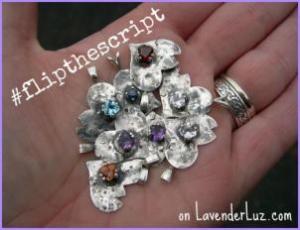 Image: Tracy Hammond
Image: Tracy Hammond
As we close out November, I’m turning this space over to adoptees. You may not agree with everything that is said in these #flipthescript posts. You may even find parts of these posts hard to read. But I believe there is value in listening, in being willing to see a viewpoint different from your own.
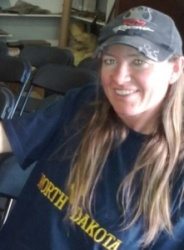 Today’s #flipthescripter is Jodi Haywood. Jodi is an international adoptee raised in a mostly-closed “relative adoption,” and a former delivery-truck-driver-turned-full-time author. When she’s not writing, researching, or studying adoption psychology, she’s training for marathons or just hanging out with her family.
Today’s #flipthescripter is Jodi Haywood. Jodi is an international adoptee raised in a mostly-closed “relative adoption,” and a former delivery-truck-driver-turned-full-time author. When she’s not writing, researching, or studying adoption psychology, she’s training for marathons or just hanging out with her family.
~~~~~
I’m sitting here listening to some music for inspiration: Extreme’s “III Sides To Every Story.” Not a coincidence.
According to adoption literature, there are three sides to the adoption “triad” — the adoptee, the birth or natural mother, and the adoptive mother or parents. The majority of adoption propaganda, however, is in favor of the adoptive parents, suggesting an imbalance of power. Advertisements show a smiling, beautiful, successful couple receiving the baby they’ve longed for, prayed for, and yes, in my view, paid for.
You won’t see what’s behind the photo: the fear and anxiety inside the tiny baby’s still-developing brain, wondering what happened to the mother who nurtured her for nine months, not understanding the relationship has been severed at the roots, or that these strangers expect to have the same relationship with her.
You won’t see the confusion in her young mind as she begins to understand that most mothers don’t give their babies up for adoption, most children don’t come to their families through an agency, and asking her friends where their parents “got” them can lead to humiliation and possibly the end of a friendship.
You won’t see her shame as she realizes the other side of having been “chosen” — that somebody else rejected or abandoned her first, leading her to wonder who will abandon her next. If she will ever be good enough for anyone to keep.
You won’t see the betrayal she feels if she doesn’t discover she’s adopted until she’s a teenager. Or in her 20s, or 30s, or maybe not until after her adoptive parents are dead and she is left to take her anger out on ghosts.
Maybe the advertisement shows the couple adopting a toddler, who has not only formed an attachment to her mother – and extended family – but is old enough to remember them and, once the photo is taken and the smiling masks come off, stubbornly refuses to call these strangers Mom or Dad.
If you only hear the adopters’ side, you’ll hear that she is their child, she is happy, healthy, and well-adjusted. The nice couple who adopted me when I was 3 said the very same things.
To a psychiatrist.
On my sixth birthday.
They took me to a psychiatrist because I wasn’t “bonding” with them. Because I often “switched off” and went into a “fantasy world” where they could not reach me. They were concerned that I “lacked empathy” and seemed restless, alternately flitting from one thing to another and concentrating on something so deeply that nothing and no one could get through to me.
They insisted it had nothing to do with my adoption or the family upheaval that led to it, even when the doctors suggested there might be a connection — very advanced thinking for that era.
They refused to allow me further visits with any psychiatrist or professional who tried to link my social anxieties or behavioral problems to growing up in an adoptive home.
They tried to force me to hold the mask in place and cooperate with their script: that I was fine, I was happy, I did not suffer from being adopted, I was grateful to them for taking me in when nobody else wanted me.
A year ago I read my mother’s script. My own mother, who had wanted to keep me, who asked the nice couple – who had begun adoption proceedings without her consent – to please return me to her. To consider some kind of shared custody arrangement, since my own father’s sister sought to adopt me.
By the time I’d discovered my mother’ side of the story, my adopting aunt — who had become my adoptive mother — was deceased and no longer writing any more of my script.
The smiling face drawn on the palm of the hand does not tell every side of the story. Like the tragic/comic theater masks, the back of the hand may be crying. Unfortunately, this is the side of adoption very few people see, or want to see.
The sight of an upraised hand, poised to strike, is a threatening gesture to those of us who have been “touched by adoption” in an abusive way. To us, celebrating adoption may mean celebrating abuse. Celebrating family separation, secrets, sealed birth records, and lies. Celebrating the lies and pretenses we have been forced to perpetuate.
Just because not every adoptee feels this way, doesn’t mean every adoptee doesn’t. And for those of us who do…
This is our side of the story. Our scripts, read in our voices.
~~~~~
In addition to writing several young-adult novels, Jodi contributed to the Adoption Therapy anthology and the soon-to-be-published Adoptee Survival Guide, and is currently working on her chapter of the Adoption Therapy 2 project.
~~~~~
Other Posts in the #flipthescript Series:
- 1: Why Are Adoptees Doing It?
- 2: Whose Script? Whose Voice?
- 3: Who is Best Placed to Talk About the Adoption Experience?
- 4: Someone Profited From My Adoption But It Wasn’t Me
- 5: Adopters: Want Trust? Give Truth.
- 6: Adoptee Rights Begin at Birth
- 7: Hold On
- 8: Adoptees Are In Reunion Whether They’re Searching or Not
- 9: The Healing Power of Open Adoption
- 10: I Guessed My Birth Mother’s Name
- 11: Abuse to Adoption to Addiction to Affirmation
- 12: A 1970s Adoption Story
- 13: Adoptee Healing & Hope
- 14: Adoption & Eating Disorders
- 15: In Adoption & Suicide

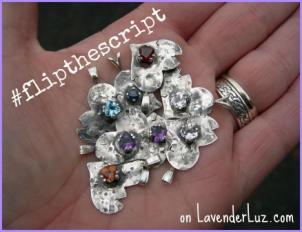
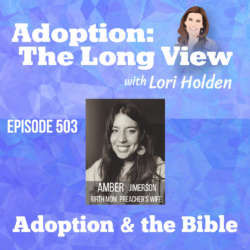
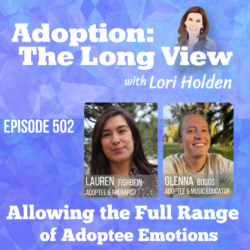
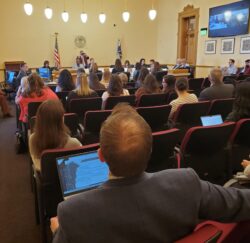
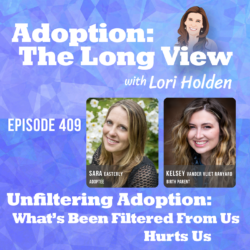
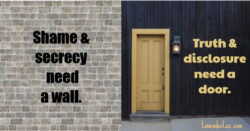
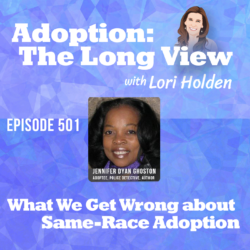
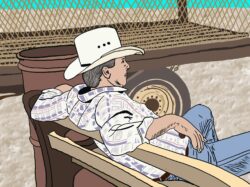
7 Responses
I’ve been thinking a lot about this post as it relates a lot with my nephew. He was removed from his birthparents by the state when he was an infant, but his adoption was not finalized until he was 5 yrs old. This meant many years of supervised visitations with his first family before the state decided to terminate their rights and make him legally free.
On one end, it’s been easy to villainize these people, especially since my nephew still has trauma from those visits (he would routinely come home crying and shaking after those visits). But the flip of it is I truly worry that he doesn’t feel safe to explore any aspect of his biological family. That because there was trauma associated there, he feels like that connection is forever severed. Hence the analogy of the smiling face on the palm with the frowning face on the back-side of the hand really got me thinking.
My question for Jodi is simple yet with what I’m betting is not a simple answer: when did you finally feel like you could explore your biological origins? And what helped you get to this point? I want to help create an environment for my nephew. But as I’m not an adoptee, I don’t know how best to do this.
Is it possible that he returned from those visits crying and shaking because he was having to again say goodbye? I’ve heard from adult adoptees of open adoption that the end of every visit felt like being left again. Imagine losing your mother over and over. As an adoptee from a closed adoption, I’ve often thought about whether open adoption would have been better and I’m not sure. While it would have been great to know her and have answers, it would have crushed me to not get to be with her all the time.
You’re right, this answer isn’t going to be simple, but I’ll try to keep it as short as I can.
I first went to live with my biological aunt & her husband when I was almost 2 years old, after spending at least a year in the care of my paternal grandparents, so these were my third set of guardians. I don’t remember what they told me in the beginning, but it took another 2 years to finalize the adoption (both of my parents were opposed to it, and I still don’t know the reasons they finally signed the papers), and at some point I switched from calling them by their first names to using parental terms – probably not my choice. I grew up in a different country and had no contact with my parents or any extended family save for my grandmother, who I believed was only related to me by adoption, not by blood. This was the same grandmother I’d lived with for a year. As I said, this story is far from simple.
While I “always” knew I was adopted, I didn’t know any of my story for a decade after being taken. It’s one thing to adopt a child from strangers and have little or no information to tell them when they start asking questions. It’s another to raise your own brother’s child and deliberately withhold all information from her. When my adopting aunt finally told me, it was the worst betrayal of my life, and I never trusted her again. I reunited with my father when I was 12, and while we got along great, I knew it upset my adopters when I called him my dad – but it felt disloyal to my dad not to call him that. I refused to recite the script they gave me word for word, but I was still afraid to rewrite it on my own terms.
I was always told my mother knew where I was – not that my aunt acknowledged her as my mother; in her mind, she was my mother, end of story – and since she chose not to contact me, I wasn’t going to pursue it. We reunited when I was 26, and I discovered I’d been hearing lies and half-truths for most of my life. We’re still in contact, and although I don’t think there are any skeletons left in the closet, I think in the back of my mind I’m still afraid the door might swing open without warning. My dad is now deceased, and so is my aunt, who denied me the opportunity to see him one last time before he died. She was the one who would have objected most strongly to my writing my own script, and I finally feel free to speak my truth, but I also feel she did all she could to stifle my voice during her lifetime. My truth did not matter. My boundaries did not matter; as far as she was concerned, they didn’t exist. I feel as if I’ve escaped a controlling relationship.
The best answer I can give you is to be honest and provide your nephew with all of the information you can – whether he asks for it or not, because he may be afraid of hurting your feelings or being rejected by you if he brings up the subject. Having information is not the same as contact; if contact is too traumatic for him, I don’t recommend it, but he does need to know his own story, and to have the freedom to make his own decisions regarding his first family – now, and as he grows up – based on his level of maturity and ability to understand. For some adoptees, it’s enough to remove the mystery surrounding their origins without connecting with them. But it is a lifelong journey and he may feel very different about his adoption later in life.
Reading your story has helped me begin to process what we’re experiencing with my nephew. For background, I married into the family when he was 9 yrs old. I was told his adoption was finalized by the state when he was 5 yrs old, so this is 4 yrs after that that I was introduced. My nephew was removed from his birthparents by the state and then spent the next 5 years with my BIL and his then-wife in a foster-to-adopt situation. The birth parents had visitation and the state did attempt to reunite him with them many times, but ultimately their rights were terminated.
What is bothering me is that, like you, my husband’s ex-SIL is quashing my nephew’s curiosity about his birth family. We hear it from him, when he talked about how he knows they were “bad,” but also in that he is talking a LOT with my husband about his adoption. I think he feels safe to do so with us, but our information is limited. Frankly, I want to starting leaning on my BIL about this, pushing him to begin revealing more information. The fear, though, is by pushing them they will not only shut down, but lash out at my nephew.
Your story helps me make this case. So thank you for writing all of this and being brave enough to share such a hard thing.
Thanks, Lori, for doing this series, and thanks, Jodi, for your perspective. I was especially intrigued by your comments about the doctors & psychiatrists suggesting that your childhood issues were linked to your adoption, and how that was advanced thinking for that era. My husband & I chose to remain childless/free and not to adopt, for numerous reasons… but one reason was certainly the mixed signals we got on the subject, including from members of our own familues. We were urged to adopt, people were puzzled why we wouldn’t do it — yet at the same time, my mother would talk about a troubled neighbour’s child & say things like “Well, you know, she’s adopted…” and talk about the “baggage” that adopted children carry with them. It was confusing to me — was adoption this wonderful thing, or wasn’t it? If I adopted a child, would my mother say the same thing then, and what would the child think if she overheard her??
I know adoption can and has been a wonderful thing for many people… and yet I’ve always felt that it wasn’t as simple and sunshine-y as people like to portray it. I’m glad that we are getting a fuller picture these days of what it means to adopt, to be adopted and to be a birth parent, even if it’s a more complicated picture than we once imagined.
I had the opportunity this last summer to meet Jodi. A wonderful human being and I truly believe her kind-hearted husband is the real Santa. He will be receiving my list soon . They are a wonderful couple that compliment and build each other up which is really impressive. Having a close-in-age adopted sibling that was struggling so, Jodi’s poignant post really left me with many questions. Even as a young girl, I knew my adopted brother was fighting alone his own demons with some serious issues, but I still don’t know why my stepfather, a medical doctor, and my RN adoptive mother refused to get him any help. Was it is just a generation that didn’t see a correlation or did they fear that they would be blamed for not being very good parents? Has there been a real shift in the stigma attached from the 60s’ until now that adoptive parents like all parents aren’t expected to have all the answers for the tough issues surrounding raising children? “They refused to allow me further visits with any psychiatrist or professional who tried to link my social anxieties or behavioral problems to growing up in an adoptive home.”
So much heartache… Thank you for highlighting this painful aspect of adoption, relinquishment & the tragedy of denying children access to all of their story. When adoption is viewed as a “cure” for infertility, perspectives become narrowed–no longer about what the children need but rather how they fulfill the dream/needs of parents. We must move from adoption-as-fairytale and embrace integrity, empathy and validation.